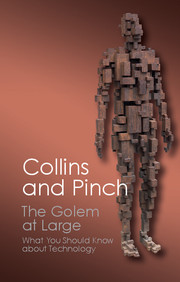Atkinson, R. (1994) Crusade: The Untold Story of the Gulf War, London: HarperCollins.
Bijker, W., Hughes, T. and Pinch, T. (1987) The Social Construction of Technological Systems, Cambridge, Mass.: MIT Press.
Burrell, A. and Hall, S. (1994) ‘A Comparison of Macroeconomic Forecasts’, Economic Outlook, Briefing Paper, 29–35, February 1994.
Cole, S. A. (1996) ‘Which Came First, the Fossil or the Fuel?’, Social Studies of Science, 26, 733–66.
Cole, S. A. (1998) ‘It's a Gas!’, Lingua Franca, December 1997/January 1998, 11–13.
Collins, H. M. (1985/1992) Changing Order: Replication and Induction in Scientific Practice, London and Beverley Hills: Sage. [Second Edition, Chicago: The University of Chicago Press.]
Collins, H. M. (1988) ‘Public Experiments and Displays of Virtuosity: The Core-Set Revisited’, Social Studies of Science, 18, 725–48.
Collins, H. M. (1991) ‘The Meaning of Replication and the Science of Economics’, History of Political Economy, 23, 1,123–43.
de la Billiere, P. (1994) Looking for Trouble: SAS to Gulf Command, the Autobiography, London: HarperCollins.
Epstein, S. (1995) ‘The Construction of Lay Expertise: AIDS Activism and the Forging of Credibility in the Reform of Clinical Trials’, Science Technology & Human Values, 20, 408–37.
Epstein, S. (1996) Impure Science: AIDS, Activism and the Politics of Knowledge, Berkeley, Los Angeles and London: University of California Press.
Evans, R. J. (1997) ‘Soothsaying or Science: Falsification, Uncertainty and Social Change in Macro-economic Modelling’, Social Studies of Science, 27, 3, 395–438.
Evans, R. J. (1997) ‘What Happens Next? Can Economic Forecasters Foretell the Future?’ Ph.D. Thesis. University of Bath.
Gieryn, T. F. and Figert, A. E. (1990) ‘Ingredients for a Theory of Science in Society: O-Rings, Ice Water, C-Clamp, Richard Feynman and the New York Times’, in Cozzens, S. and Gieryn, T. (eds.) Theories of Science in Society, Bloomington: Indiana University Press.
Gooding, D. (1985) ‘In Nature's School: Faraday as an Experimentalist’, in Gooding, D. and James, F. A. (eds.) Faraday Rediscovered: Essays on the Life and Work of Michael Faraday, 1791–1876, London: Macmillan.
Kuhn, T. S. (1961) ‘The Function of Measurement in Modern Physical Science’, Isis, 52, 162–76.
Lewis, M. (1989) Liar's Poker, London: Hodder and Stoughton.
MacKenzie, D. (1991) Inventing Accuracy: A Historical Sociology of Ballistic Missile Guidance, Cambridge, Mass.: MIT Press.
McCloskey, D. (1985) The Rhetoric of Economics, Madison, Wis.: University of Wisconsin Press.
McConnel, M. (1988) Challenger: ‘A Major Malfunction’, London: Unwin.
Ormerod, P. (1994) The Death of Economics, London: Faber and Faber.
‘Performance of the Patriot Missile in the Gulf War’, Hearing before the Legislation and National Security Committee of the Committee on Government Operations, House of Representatives One Hundred and Second Congress, Second Session, April 7 1992.
Pinch, T. J. (1986) Confronting Nature: The Sociology of Solar-Neutrino Detection, Dordrecht: Reidel.
Pinch, T. J. (1991) ‘How Do We Treat Technical Uncertainty in Systems Failure? The Case of the Space Shuttle Challenger’, in La Porte, T. (ed.) Responding to Large Technical Systems: Control or Anticipation, Dordrecht: Kluwer, 137–52.
Postol, T. A. (1991) ‘Lessons on the Gulf War Experience with Patriot’, International Security, 16, 119–71.
Postol, T. A. (1992) ‘Correspondence’, International Security, 17, 225–40.
Report of the Presidential Commission on the Space Shuttle Challenger Accident (1986). Five Volumes. Washington, June 6.
Shapin, S. (1988) ‘The House of Experiment in Seventeenth-Century England’, Isis, 79, 373–404.
Shapin, S. (1994) A Social History of Truth: Civility and Science in Seventeenth-Century England, Chicago: The University of Chicago Press.
Stein, R. M. (1992) ‘Correspondence: Patriot Experience in the Gulf War’, International Security, 17, 199–225.
Van Creveld, M. (1985) Command in War, Cambridge, Mass.: Harvard University Press.
Vaughan, D. (1996) The Challenger Launch Decision: Risky Technology, Culture and Deviance at NASA, Chicago: The University of Chicago Press.
Wallis, K. F. (ed), Andrews, M. J., Fisher, P. G., Longbottom, J. A. and Whitely, J. D. (1987) Models of the UK Economy: a Third Review by the ESRC MacroModelling Bureau, Oxford: Oxford University Press.
Wynne, B. (1988) ‘Unruly Technology: Practical Rules, Impractical Discourses and Public Understanding’, Social Studies of Science, 18, 147–67.
Wynne, B. (1989) ‘Sheepfarming after Chernobyl: A Case Study in Communicating Scientific Information’, Environment, 31, 10–15, 33–9.
Wynne, B. (1996) ‘Misunderstood Misunderstandings: Social Identities and Public Uptake of Science’, in Irwin, A. and Wynne, B., Misunderstanding Science? The Public Reconstruction of Science and Technology, Cambridge and New York: Cambridge University Press, 19–46.





